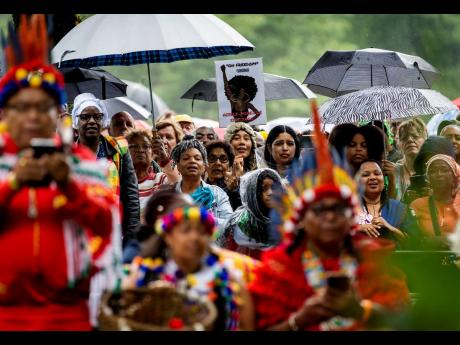In that moment and many more moments before and to come, I was made aware of the sameness of us as a people because it is just as important in The Bahamas to be seen, to be acknowledged. It is not uncommon for someone to walk into a room and announce “see me here!”. I used to wonder if this propensity to be known to speak loudly, to wear flashy things and attract attention was a rejection of a past in which one had to be invisible to stay alive but this interaction with Rasta Frankie, walking on the streets of Legon, dispelled this notion. This sameness this, “nkonsonkonson”, allowed me to understand that we as a people want to be seen because we inherently embrace an Ubuntu philosophy. We want to be seen by other people because our humanity is known through people. Reparations that is embedded with a Ubuntu philosophy is the process of repairing our personhood. It is the way in which we can collectively call “See me here!”, the way in which we can be seen.
The question here then is what happens to a people who were never meant to be seen, whose bodies were to be consumed but whose names were erased? A people whose voices were choked out never to be heard and whose very existence was safer if invisible?
“To ghost someone is to ignore them, to see through them, and to look past them. To ghostline a people’s history is to systematically ignore the meaning of their collective experience, generation after generation, century after century…, is the cunning practice, adopted by whole societies, of “unseeing” the plundered parts, and “unhearing” their historical demands for reparative justice.
Not content with merely outlining the problem, Manjapra suggests that reparations can be used as a tool with which to bring back structure to that which they tried to eliminate.
“Reparative justice demands ways of retelling the past that detect the voices previously consigned to the archival void; and of rewriting history in ways that matter to those voices and that make those voices matter to us … The ghosts in our history demand reparative action – diverse practices of reparations, restitution, and redress – by all of us standing on the ground of slavery and by the ruling order built upon it. Through reparative action, based in the will to truth and peace, not the will to power, we can all help one another become more human or, perhaps, more than the humankind we have known.”
This suggestion that reparations can help us to become more than the humankind we have known, is what I mean when I say reparations as personhood. Reparations remixed as more than the popular notions of a payout to include definitions that help us to restore ourselves. Reparations as a tool to help us see the fullness of our humanity first within ourselves and then within each other.
Niambi Hall-Campbell Dean is chair of Bahamas National Reparations Committee.
Send feedback to reparation.research@uwimona.edu.jm

